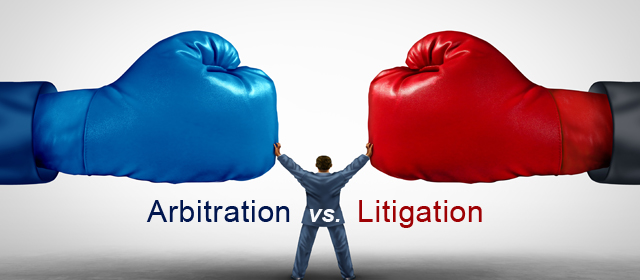California Employment Law: Pros & Cons of Arbitration
by Lewitt Hackman’s Employment Practice Group
As of July 11, 2019
Arbitration is a highly controversial topic in California.
Just last year 20,000 Google employees walked off the job in protest of Google’s policy to arbitrate workplace misconduct claims. A few weeks ago more than 200 Riot Games (creator of League of Legends) employees did the same – the first of its kind in the video game industry.
How did this alternative dispute resolution mechanism become so controversial? Let’s try to unpack this loaded question.
What Is Arbitration Anyway?
To put it simply, arbitration is a paid private trial. Parties enter a contract (arbitration agreement) in which they agree that if a dispute arises, they will submit the dispute to a third party arbitrator, rather than the courts.

Why Should I Pay for Something I can Get for Free??!
Excellent question. Here’s why:
- Confidentiality. Court proceedings are public and therefore, almost all documents filed and testimony heard is open to the general public. Arbitration proceedings, however, are private and confidential. Generally, only the arbitrator and the disputing parties are privy to confidential information submitted during arbitration.
- Choosing Your Judge. In traditional litigation, the parties do not have the option of choosing their judge. In arbitration, however, the parties can mutually agree on who will act as the arbitrator.
- A Professional Adjudicator. In traditional employment litigation, a jury normally decides the case. Jurors often do not have knowledge or understanding of the litigated matter, which requires the litigants to “educate” the decision makers. In arbitration, however, the parties can elect experienced professionals who are well-versed in legal matters.
- It’s Quicker. Traditional litigation can persist for years, partially due to the court’s heavy workload and capacity. In arbitration, however, proceedings tend to be faster.
- Class Action Waiver. Valid arbitration agreements can include a class action waiver. This was recently confirmed by the U.S. Supreme Court in Epic Systems Corp. v. Lewis (May 2018) 137 S. Ct. 1612. In other words, a party to a valid arbitration agreement that included a class action waiver can be compelled to privately arbitrate the dispute on an individual basis, rather than bring a class action on behalf of other employees.
- Finality. Once decided, an arbitration award is final and binding and cannot be appealed or overturned except in limited circumstances (e.g. if the award was a product of fraud, corruption, or misconduct by the arbitrator). In other words, when it’s done, it’s done.
Sounds Great! Why Doesn’t Everybody Choose Arbitration?
Yes, arbitration can be great, but it’s not for everyone. Here’s why:
- Employer Expense. In the employment context, employers must pay the arbitrator’s fees in full. This can be very expensive as arbitrators’ fees can be very high.
- PAGA Waivers. The Private Attorneys General Act (PAGA) authorizes aggrieved employees to file lawsuits for Labor Code violations on behalf of themselves and other “aggrieved” employees. If there is an award, it is split 25-75 percent between the aggrieved employees and the state (respectively). Based on recent case law in Iskanian v. CLS Transportation (2014) 59 Cal.4th 348, PAGA claims are not waivable like class action claims because they belong to the State – employees are not able to waive these.
- Speed. Sometimes, a slower pace can work for an employer’s benefit. With time a Plaintiff’s emotions may subside and a desire to settle and move on can replace an initial desire for “vengeance.”
- Finality. No matter how unjust you think the award may be, you cannot appeal or ask for a review of a binding decision, except in very limited circumstances (see above). The ability to appeal a ruling can be powerful leverage.
Okay, So Arbitration is Not Everyone’s Cup of Tea. Why the Controversy?
Confidentiality. The Google and Riot protests came in the wake of the #MeToo movement and reports of sexism. Employees viewed the confidential arbitration practice as management’s attempt to hide wrongdoing and protect the alleged wrongdoers (who were in upper-level management positions).
As a result of the protests, Google announced it was eliminating its forced arbitration practice for all employees. Riot announced new employees will be given the choice to opt-out of mandatory arbitration for individual sexual harassment and sexual assault claims and will consider expanding the scope of the opt-out to existing employees as well. Facebook, Uber, Lyft, and Airbnb followed suit and announced they will end forced arbitration of workplace harassment claims.
On the legislative front, attempts to prohibit or deter use of employment arbitration agreements persist. Just last year Governor Brown vetoed (again) a bill which aimed to ban mandatory arbitration agreements. And this year SB 707, which aims to create sanctions for an employer’s failure to timely pay arbitration fees, is making its way through the legislature. In the bill’s comments the authors opined that “Arbitrators who issue favorable awards to a particular company can be repeatedly-hired by that same company to serve as the arbitration-neutral without ever notifying the public about that award-history. It’s easy to predict the calls if you can hire the umpire.”
So what’s the Deal? Are You For or Against Arbitration?
Like many things in life, arbitration is not a “one-size-fits-all” solution. Whether or not arbitration will work for your business depends on your size, finances, matters of concern, and risk tolerance. Legislative challenges to arbitration agreements and employee activism may also impact decisions regarding arbitration.
As always, we are here to listen, discuss, and offer advice on how to operate in the deep and troubled waters of California employment law.